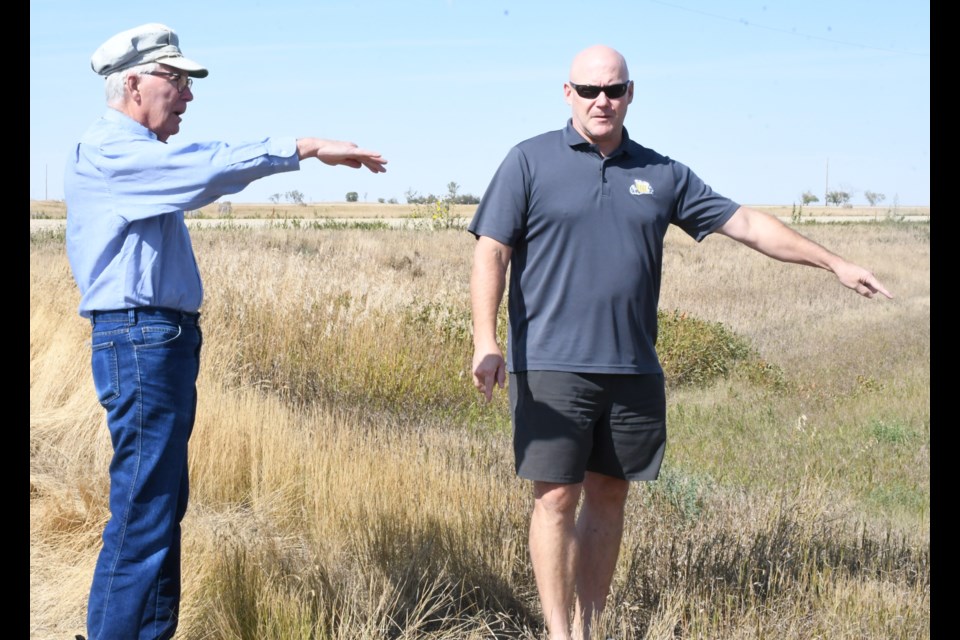A parcel of prairie grasslands southeast of Moose Jaw will never see any human-made development and will remain the home for countless animals forever, thanks to a donation from a rural landowner.
Jerry Kaiser lives in the Rural Municipality of Baildon and has donated 52 hectares (130 acres) to the Saskatchewan Wildlife Federation (SWF). The field — roughly a quarter-section in size — is located near the entrance to the unincorporated community.
On a recent sunny and windy afternoon, Kaiser handed over the patch of prairie to Darren Newberry, the SWF’s director of habitat lands. The director then installed five signs at all corners and legal access points that said the grasslands were “habitat trust lands” and dedicated to wildlife in perpetuity — so hunting is prohibited but hiking is acceptable.
Meanwhile, next year, the SWF will install a cairn near the Baildon entrance that recognizes Kaiser’s donation. The plaque will read, “Baildon Community Nature Reserve: Dedicated to past, present and future Kaiser kin and for the preservation of wildlife habitat.”
Kaiser explained that his grandfather, Andrew, bought the land in 1912 and began working on it. However, once the 1930s arrived, the property began experiencing terrible wind erosion that made farming difficult.
Jerry’s father, Erlin, who grew up during the Great Depression and experienced those Dust Bowl years, took over farming in the 1970s. However, he became so frustrated with the wind blowing around the dirt that he retired, planted grass instead, and moved to the West Coast.
Jerry did some organic farming for a while, but in 2007, he had a dream of turning the grasslands into a forest and planted 100,000 trees. However, most died because the conditions were too dry. Yet, a few hearty species survived, including maple, oak, chokecherry and caragana.
“Every time we get a land donation, it is something special … ,” said Newberry. “Land for habitation is declining everywhere, so it’s beneficial (to receive these parcels) for future animals and people.”
The SWF receives several parcels as donations annually, while it maintains roughly 32,000 hectares (80,000 acres) throughout the province, mainly in east-central Saskatchewan near Yorkton and Rocanville.
Newberry noted that it manages very little land in south and southeast Saskatchewan, mostly because it’s used for farming and is expensive to acquire.
“It’s a huge thing for people to donate land and see the value of it versus the price of land value … ,” he said. “The SWF does not own a lot of land in this area, so to get it is huge. It makes it extra special.”
Newberry added that the organization would monitor the land annually and ensure it continues to provide healthy habitation for animals.
“I’m very interested in environmental issues … (and) my desire is to do what I can for the environment,” Kaiser said, noting the untouched grasslands will provide habitation for grouse, deer, meadowlarks and other critters forever.
The fact that humans are causing climate change “can’t be denied,” while all people have a duty to mitigate the change according to ability, he continued.
“Some people can only keep their own nest clean (while) others have more resources. I’m fortunate to have had a quarter-section of land to be set aside for permanent wildlife habitat, which will also act as a carbon sink,” Kaiser remarked.
Individuals’ actions can address climate change, but governments must take a stand, he added. He encouraged people to contact their political leaders and demand that they support alternative energy sources and subsidize conversion to electric vehicles.
Visit the for more information.




